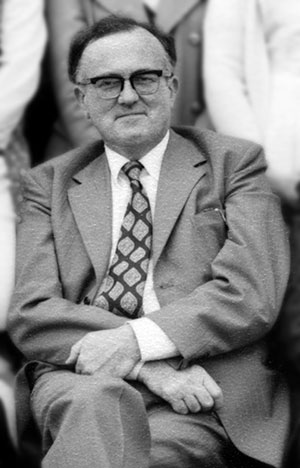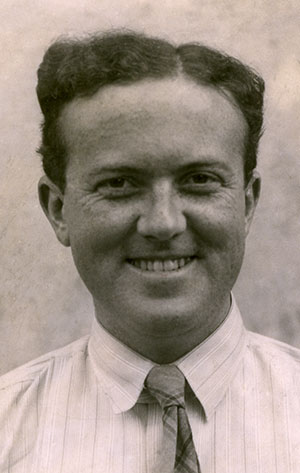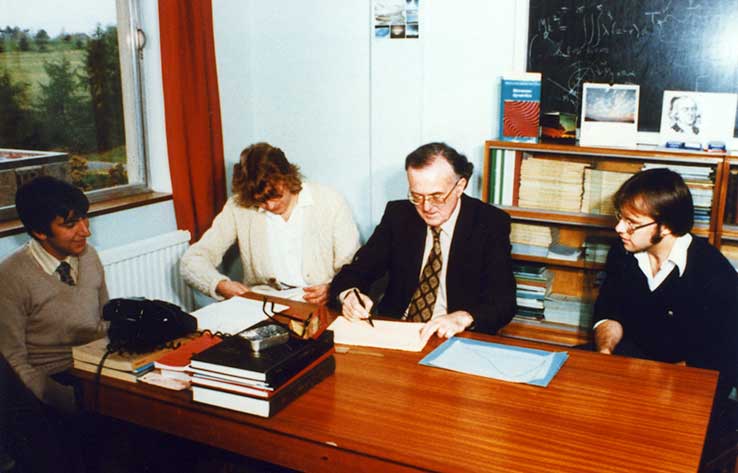Professor David Rowland Davies,
PhD, DSc, ARCS, FIMA, FRMetS
Mathematician and Meteorologist

Professor D Rowland Davies
(ABCS 1931 - 1937)
Rowland Davies was born January 6, 1919 in Aberdare. His father, John Davies, was employed as a miner involved in work with explosives, possibly as a shotfirer or fireman. His mother, Catherine, née Waters, (known locally as Kate Rowlands) ran a sweet shop on the Gadlys, but she was also strongly committed to her religious interests and offered her services as a Methodist lay preacher. The family lived in Oxford Street near the school, but moved to 14, Broniestyn Terrace in Trecynon, the home of John’s brother and his two sisters, after the death of Rowland’s mother who died when her son was still quite young. John Davies himself died when Rowland was in his early twenties.
Rowland attended the local elementary school which was Park Boys’ School. He transferred from there to the County School in September 1931 where he displayed strong academic qualities as well as representing the school in rugby. He gained a sound pass in the School Certificate Examination, 1935, gaining distinctions in four subjects as well as Matriculation Exemption. Then two years later at the Higher Stage of the School Certificate, he passed in Chemistry, Pure & Applied Mathematics and Physics with distinctions in the last two. On the basis of his very strong ‘Higher’ results he was awarded a State Scholarship which gave him a sum of £100 per annum plus his university fees. He subsequently moved to London where he studied mathematics at The Imperial College of Science & Technology.
After his graduation, which occurred during the war years, he was immediately recruited as a Research Assistant to William Penney1, who was then a Reader in Mathematics at Imperial. Penney was interested in hydrodynamic waves and his war work was concerned with underwater blast waves created by explosives. Subsequently Rowland went to the Porton Experimental Station near Salisbury to continue war work on gaseous diffusion. Following this position, he was recruited into the Air Force as a weather forecaster where he first became involved in meteorology. Whilst in the forces he continued working for his Ph.D. thesis, which unusually he completed without the help and direction of an Academic Supervisor. The thesis was submitted while he was still in the RAF. This degree, like all his others, was awarded by the University of London.
After the war Rowland returned to work in the academic sector, holding posts at Liverpool, Aberystwyth, Southampton and Sheffield Universities before accepting a Chair at Bangor in 1960. In 1968, he moved to Exeter University as Professor of Applied Mathematics where he remained until he retired in 1984. During this period he served as both Head of the Mathematics Department and as Dean of the Science Faculty. He also served on the Council of the Royal Meteorological Society.
His professional interests in the 1940s and 1950s were concerned mainly with heat transfer, diffusion and turbulence. But as time went on he became increasingly interested in the application of mathematics to meteorology. An early indication of this interest was a request made by the extra mural studies department at Sheffield in the autumn of 1950 that he should give a series of lectures on elementary meteorology. Much later, in his inaugural lecture at Exeter, he remarked that “nature is a hard taskmaster, but the challenge to understand (and perhaps control) our physical environment is an exciting one”. By the mid 1960s his interest in meteorology had developed to the extent that he was publishing papers concerned with the mathematical modelling of atmospheric circulation, which eventually led him to attempt to make seasonal weather forecasts. Indeed by the 1980s he had written several papers on this subject, including some on prediction, which were published in Weather, the ‘house’ journal of the Royal Meteorological Society.
Rowland was well known not only for his research but also for being a very good teacher. His enthusiasm for meteorology was contagious and he transferred this to both his undergraduate and graduate students, many of whom became professional meteorologists. Rowland was also responsible for organising several successful international conferences which he hosted in his department at Exeter. Their success, both scientifically and socially, was in no small way due to the Rowland’s enthusiasm and personal qualities.
If Rowland had one interest outside mathematics and meteorology, it was rugby. As a boy he played for the school and at university he played for the Royal College of Science in London. In later life, he was a passionate follower of the Welsh team and was often seen by his family with his face a few inches from the television screen shouting his encouragement. Another characteristic that the family recalled fondly was his terrific sense of humour.
After Rowland’s retirement in 1984, he was awarded the title of Emeritus Professor and continued to take an active interest in the department at Exeter, not least in the supervision of postgraduate students. His untimely death, after a short illness, occurred at the age of 72 on April 23, 1991. His funeral service took place in Exeter and at a later date there was a memorial service at the University.
In 1947 while at Liverpool, Rowland married his departmental secretary Lilian Muriel Williams, a native of that city. They raised three children: one son, John, and two daughters, Catherine and Ceri. Their son John R. Davies is an academic, working as a biologist.

After the award of his DSc in April 1956

Rowland Davies early in his career

Professor Davies conducting a seminar with his research students in the Maths Department at Exeter University
- William Penney (1909-91) gained his BSc and PhD at Imperial College. He returned in 1936 and until 1945 held an academic post there, but also worked for the Admiralty studying underwater blast waves, and on the design of the mulberry harbours. After 1945 he worked on the development of the British atomic bomb, and stayed in the nuclear industry becoming chairman of the UKAEA from 1946-67. He was knighted (1952) and accepted a life peerage in 1967, when he also returned again to Imperial to become its Rector.
Many thanks to David Martin Burridge for providing much of the information for this account of D.R. Davies’s career, and to Rowland’s wife and son John R. Davies for family information and for the second and third photographs. The sources used were as follows: the Guardian obituary (May 6, 1991) written by DR’s friend Ivan Roots; and the article written about DR by F.H. Bushby in The Quarterly Journal of the Royal Meteorological Society, Vol. 117, July, 1991.